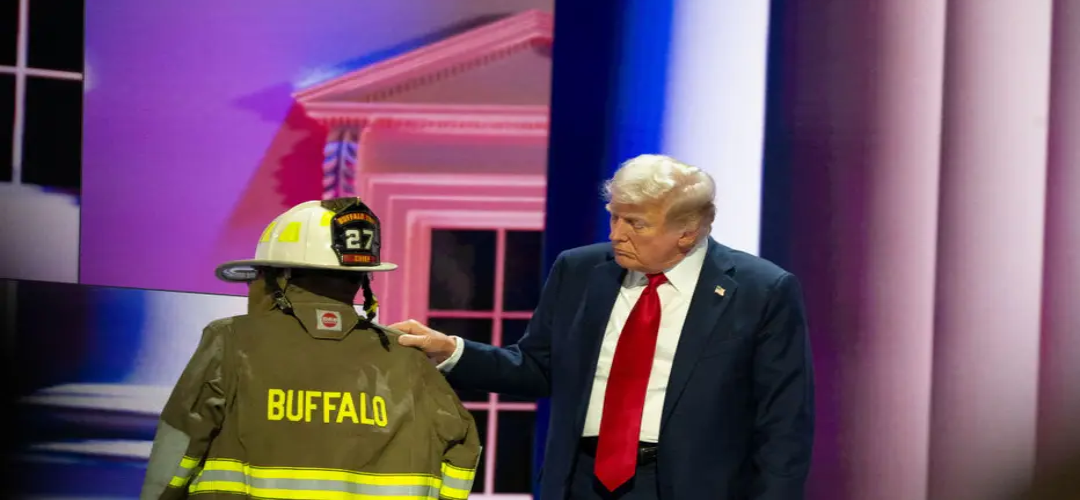A historic turn of events occurred in the globally watched U.S. elections campaign with a botched assassination attempt.
The world watched with growing shock on live TV as America narrowly missed adding another illustrious political figure to its Hall of Fame to those felled by assassin’s bullets.
A bullet fired from a roof top perch by a nondescript young man with no clear political motive clipped the right ear of former President Donald Trump, killing a fireman sitting in rows echeloned behind him and seriously injuring two other persons.
Unsurprisingly, Mr Trump’s stock in the election polls immediately rose, and even as a frail-looking President Biden finally succumbed to pressure from within Democratic ranks to surrender his re-election bid. Shocked by his incoherent performance in the first presidential debate, 36 congressional Democrats had publicly urged Biden to withdraw from the race.
Now the focus is on Vice President Kamala Harris.
Background
In a sombre and reflective address, President Joe Biden urged Americans to defend Democracy, likening it to a grand, intricate symphony that requires harmony and cooperation to resonate. He emphasised that this fundamental principle transcends any individual title or office, serving as the essential score to the nation’s enduring narrative. His exit is closely tied to the electoral prospects of Vice President Kamala Harris, who is expected to be the Democratic Party’s nominee. Biden endorsed the nomination of Harris as the new presidential candidate.
With barely 100 days left for the elections, the GOP is scurrying in its efforts to meet the challenge posed by a freshly resurgent Trump with his battle cry of ‘Making America Great Again.’
The Democratic Party is now rallying around Vice President Kamala Harris to avert a potentially chaotic scenario at the Democratic National Convention next month. With echoes of the tumultuous 1968 Chicago convention reverberating, there is a marked sense that the current situation differs fundamentally from that historical precedent. An open nominating process could potentially rejuvenate the party’s base and attract a broader electorate.

Analysis
Caught by surprise, Ms Harris has stood up well so far on being suddenly thrown under the spotlight. While the jury is still out on whether she will win the final nomination, considering the poor field that opposes her, the odds are in her favour. Like most of her predecessors, her performance as Vice President was low in visibility and substantial content, even though she had taken considerable interest in managing the migrant crisis along the Mexican border.
Distinguished by her prosecutorial acumen, Vice President Harris would appeal to younger voters, women, and communities of colour. This is especially pivotal as the GOP continues to emphasise socially conservative issues, including abortion and civil rights rollbacks.
If nominated, Vice President Harris faces a tough and steep road ahead. Veteran Democratic strategist James Carville has underscored the urgency of the situation. With the general election slated for November 5th and the Democratic Convention set for August 19-22, Harris faces an unusually compressed campaign timeline. Whereas presidential campaigns traditionally span eight months, Harris will contend with at least four. Carville advocates for a strategic emphasis on swing states where Biden’s approval ratings have been lacklustre, stressing the critical need for a vigorous ground game and clear, compelling messaging.
As per Forbes (25 July 24), two polls taken since Biden dropped out show Harris leading: Morning Consult’s weekly presidential race poll, conducted July 22-24 among 11,297 registered voters, shows her with 46% support, compared to Trump’s 45%, while she is up 44% to 42% over Trump in a Reuters/Ipsos poll conducted Monday and Tuesday.
Former President Donald Trump remains a highly polarising figure, yet he has adeptly mobilised a significant and vibrant support base. His campaign strategies, marked by misinformation and divisive rhetoric, pose a formidable challenge for the Democratic Party. To effectively counteract this, Harris will need to engage directly with the electorate, address their pressing concerns, and systematically dismantle the narratives that Trump and his allies propagated.
The Republican campaign, undeterred by conventional norms of fairness, is anticipated to be exceptionally aggressive and unyielding. This necessitates Harris craft a robust and resilient campaign strategy focusing on clear and compelling communication to navigate and counter the intense and potentially disorienting attacks she will face.
The forthcoming months will be pivotal for both political parties, resembling the final stretch of a high-stakes race where every move can determine the outcome. For the Democrats, achieving unity and articulating a cohesive message will be crucial to galvanising support and rallying their base, much like a team synchronising their efforts to cross the finish line in unison. Conversely, the Republicans will focus on consolidating their core constituency and capitalising on perceived shortcomings of the incumbency, akin to a runner leveraging their strengths and exploiting their competitor’s weaknesses.
Assessment
- As the nation approaches the election, the stakes are extraordinarily high, with the future trajectory of American Democracy at the heart of the national discourse. Globally there is much apprehension as to the direction the great power will take with Trump at the helm.
- Harris’s historic candidacy as the potential first Black and South Asian American president requires her campaign to not only address the Biden administration’s legacy but also present a clear vision for the future.
- The encouraging news is that, slowly and steadily, the election is not appearing as one-sided as it looked only a few weeks ago. Liberal Democracy may yet triumph in the U.S.




